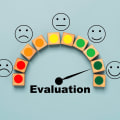In today's fast-paced business world, optimizing workflow processes is crucial for success. One key area where this is especially important is in customer relationship management (CRM). A well-organized and efficient CRM strategy can make all the difference in building and maintaining strong relationships with customers. In this article, we will dive into the various ways in which optimizing workflow processes can contribute to a successful CRM strategy.
From automation and integration to streamlining processes and increasing efficiency, we will cover all the important aspects of optimizing a CRM system. Whether you are a business owner, manager, or employee looking to improve your company's CRM strategy, this article is for you. So, let's get started and discover how optimizing workflow processes can lead to a more successful and effective CRM strategy. Welcome to our guide on optimizing workflow processes for a successful CRM strategy. In today's competitive business landscape, having a strong customer relationship management (CRM) strategy is essential for success.
However, simply having a CRM system in place is not enough. To truly make the most of your CRM, you need to optimize your workflow processes. First and foremost, it's important to understand why optimizing workflow processes is crucial for a successful CRM strategy. By streamlining and automating your processes, you can save time, reduce errors, and improve overall efficiency. This is especially important in today's fast-paced business world where customers expect quick responses and personalized interactions. Additionally, optimizing your workflow processes can help you make the most of your CRM system by utilizing features such as analytics and integration with other business processes.
To begin optimizing your workflow processes, it's important to first assess your current CRM system and identify areas that need improvement. This may include manual tasks that can be automated, data entry processes that can be streamlined, or integration with other systems that can improve overall efficiency. Once you have identified areas for improvement, you can then start implementing tools and techniques to optimize your workflow processes. There are various tools and software available that can help optimize your workflow processes. These may include automation tools that can handle repetitive tasks, data management tools that can streamline data entry and organization, or analytics tools that can provide valuable insights into customer behavior and preferences. In addition to using tools, it's also important to focus on proper implementation and training for your CRM system.
This includes training employees on how to effectively use the system, as well as ensuring proper integration with other business processes. By properly implementing and training employees, you can ensure that your CRM system is being used to its full potential and optimizing your workflow processes. Furthermore, don't underestimate the importance of regularly reviewing and updating your workflow processes. As your business and customer needs evolve, so should your workflow processes. Regularly assessing and making improvements to your processes can help keep your CRM strategy effective and up-to-date. Overall, optimizing workflow processes is crucial for a successful CRM strategy.
By streamlining and automating tasks, utilizing tools and software, properly implementing and training employees, and regularly reviewing and updating processes, you can make the most of your CRM system and improve overall efficiency and customer satisfaction.
Tools and Techniques
When it comes to optimizing workflow processes for a successful CRM strategy, choosing the right tools and techniques is crucial. These tools and techniques can help streamline your processes, improve efficiency, and ultimately lead to better customer relationships. One important tool to consider is workflow automation software. This software allows you to automate repetitive tasks, freeing up time for your team to focus on more important tasks. It can also help eliminate human error and ensure consistency in your processes. Another useful technique is process mapping.This involves visualizing your workflows, identifying inefficiencies, and making necessary changes to improve them. Process mapping can also help with communication and collaboration among team members. Data analytics tools are also essential for optimizing workflow processes. These tools can provide insights into your CRM data, helping you identify trends and areas for improvement. With this information, you can make data-driven decisions to optimize your processes. Lastly, integrating your CRM system with other tools such as email marketing software or project management software can greatly improve workflow processes.
This allows for seamless communication and data sharing between different systems, reducing manual work and increasing efficiency.
Proper Implementation and Training
When it comes to optimizing workflow processes for your CRM strategy, one of the most important factors is proper implementation and training for employees. No matter how well-designed your CRM system may be, it will not be effective if your employees are not properly trained on how to use it. First, it is crucial to ensure that your CRM system is implemented correctly. This means that all necessary integrations and configurations are in place, and that the system is set up to align with your specific business needs. It is also important to thoroughly test the system before rolling it out to employees. Once your CRM system is properly implemented, the next step is to train your employees on how to use it.This includes providing them with a clear understanding of the system's features and functionalities, as well as any processes or workflows that are specific to your business. It is also helpful to provide ongoing training and support to ensure that employees are continuously utilizing the CRM effectively. Proper implementation and training not only ensures that your CRM system is being used to its full potential, but also improves employee productivity and efficiency. When employees are confident in using the system, they can better manage customer relationships and contribute to the overall success of your CRM strategy.
Identifying Areas for Improvement
When it comes to optimizing your CRM strategy, the first step is to assess your current system and identify areas for improvement. This can be a daunting task, especially if you have a large amount of data and processes to sift through.However, it is a crucial step in ensuring that your CRM is working efficiently and effectively for your business. The best way to approach this is by breaking down your CRM into smaller components and analyzing each one individually. Start by looking at the data you are collecting and how it is being stored. Is there any redundant or outdated information that can be removed? Are there any gaps in the data that need to be filled?Next, analyze your processes and workflows. Are there any bottlenecks or inefficiencies that are slowing down your CRM system? Are there any manual tasks that can be automated to save time and reduce errors?It's also important to involve your team in this process.
They are the ones using the CRM on a daily basis and can provide valuable insights on areas that need improvement. Encourage open communication and brainstorming sessions to identify potential areas for improvement. By taking a thorough and systematic approach to assessing your current CRM system, you can identify specific areas that need improvement and make targeted changes to optimize your workflow processes. This will not only improve the overall efficiency of your CRM, but also help you achieve a successful CRM strategy.
Regular Review and Updates
In order to ensure the success of your CRM strategy, it is crucial to regularly review and update your workflow processes. This allows you to identify any inefficiencies or bottlenecks in your processes and make necessary changes to improve overall efficiency. One of the key benefits of regular reviews is that it helps you stay on top of any changes in your business or industry.As your business grows and evolves, your workflow processes may need to adapt to accommodate new strategies or initiatives. By regularly reviewing and updating these processes, you can ensure that they remain aligned with your current goals and objectives. Another important aspect of regular reviews is that it allows you to gather feedback from your team members. They are the ones who are actively using the CRM system and can provide valuable insights on what is working well and what needs improvement. This feedback can help you identify areas for optimization and make necessary updates to streamline the workflow. Moreover, regular reviews can also help you identify any potential issues or roadblocks that may be hindering the success of your CRM strategy.
By addressing these issues in a timely manner, you can prevent any major setbacks and keep your CRM system running smoothly. It is important to note that regular reviews should not just be limited to a one-time event. Rather, it should be an ongoing process that is integrated into your overall CRM strategy. By conducting regular reviews and updates, you can continuously optimize your workflow processes and ensure the success of your CRM strategy. Optimizing workflow processes is a continuous process that requires regular assessment, updates, and implementation of tools and techniques. By doing so, you can improve efficiency, save time, and make the most of your CRM system for a successful strategy.
Remember to regularly review and make improvements to your processes as your business needs evolve. With these tips and techniques, you can optimize your workflow processes and achieve a successful CRM strategy.



